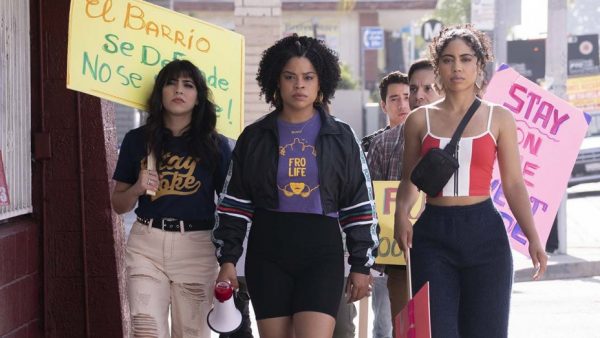TV Review: “Gentefied” — Cultural Decimation, Courtesy of Real Estate
By Sarah Osman
Netflix’s newest comedy is a hilarious — though pointed –look at one of America’s biggest problems.

A scene from Gentefied. Photo: Kevin Estrada/Netflix.
Gentrification, the process of renovating and improving housing so that it appeals to the middle class, is more than an American problem; it’s become a global crisis. In nearly every major city in the world the working class is struggling with rising rents and housing costs. Many are being kicked out of their homes. Displacement runs rampant in Los Angeles, where people of color (primarily) have been forced to leave their homes, shops, and restaurants. The hipsters have invaded, bringing with them Trader Joe’s and metro bikes. What in the past were vibrant Latino communities, including Silver Lake, Echo Park, and Los Feliz, are now full of 20- and 30-something white folks. Gentrification is now seeping into the Latino neighborhood of Boyle Heights, which has fought it off with a vengeance. Anti-gentrification activists are protesting the opening of new art galleries. The activists seek affordable housing, healthy grocery stores, and laundromats in place of hipster art. Activists are using social media and marches to call out what they consider to be “white privilege.”
The fight against real estate and big money is the premise behind Netflix’s Gentefied, which premiered on February 20. It’s not the first TV show to take up the issue — Starz drama Vida focused on the same dilemmas. Neither is it the first Latinos-in-LA show; Hulu’s late East Los High focused on Latino teenagers in East Los Angeles. Netflix’s One Day at a Time revolves around a Cuban family in Echo Park. However, it’s not as though there are dozens of comedies about Latinos — nor are there many comedies about Asian or Arab Americans. So Gentefied is a welcome addition, supplying a much needed jolt of diversity. The show also continues the web series to TV series trend that has become a valuable stepping-stone for minority filmmakers — HBO’s Insecure started in the same way.
Created by Marvin Lemus and Linda Yvette Chávez, and executive produced by America Ferrera, Gentefied follows three cousins and their grandfather, known as Pop (Joaquín Cosío), who runs a local taqueria. Pop is worried (although he does not let it show) about the fate of his restaurant; he is behind on the rent and the property is being eyed by prospective buyers. The cousins include Erik (Joseph Julian Soria), who works for Pop and has a baby coming with Lidia (Annie Gonzalez), his former flame; Ana (Karrie Martin), an aspiring artist with a young daughter and a lover, Yessika (Julissa Calderon); and Chris (Carlos Santos), who is determined to study at Le Cordon Bleu in Paris.
Chris, the most mature of the cousins, is employed by a fancy (and pain-in-the-ass) chef downtown. His coworkers question his Mexicanness, and they put him to an absurd test to prove his ethnic cred: he has to dance, identify candy, and list three telenovelas starring Thalia. Chris’s identity crisis is understandable to anyone who has tried to balance between two cultures –and is rejected by both for not being “whatever” enough. At one point, he decides to create “chicken tikka masala tacos,” much to the confusion of the customers, who ask where the radishes and jalapenos are. Chris can be frustrating, but his antics are endearing. Erik, on the other hand, is very comfortable with who he is and scoffs at Chris’s ideas about marketing via social media. Essentially, Erik is a lovable goofball who tries his best to impress Lidia (who is his mental superior); his attempts to woo her are sweet.
Ana faces a similar challenge, which is how to balance her ethnic background with her desire to be an artist. She’s hired by a gay white man to paint a rather questionable mural on the side of a building he purchased. This would be fine — except that the woman renting the building begins to lose clients because of the picture. Ana is constantly torn between her art and her identity — her mother demands she get a job, while her ambitious girlfriend keeps pushing her to move up in the art world. Ana and Chris are both caught in their own battle against internal gentrification, which turns out to be a subtle comment on a much larger issue.
White people rarely appear, and when they do they are portrayed as either terrible human beings or completely oblivious to minorities. Chris’s boss is a cartoon parody of Gordon Ramsey; outsiders who try to help the family end up harming more than they help.
Gentefied is nothing if not contemporary. Conscious that the show is airing in an election year, episodes talk about “The Wall,” toxic masculinity, the intersection of race and identity and, of course, gentrification. This means that the effort has far more to say about current affairs than most comedies. The success of the American Dream is seen as a trap — moving ahead means giving up on your family and friends. Then, once you do your best to provide for your children, big business comes in and tears your plans apart. Family is the site for painful intergenerational conflict. This focus on the turmoil of the present (personal and political) makes the show far more powerful than other programs that have dealt with the challenges presented by immigration and identity. Let’s hope that Netflix doesn’t sell out Gentefied for more innocuous fare; this show shouldn’t disappear, as have so many of the historic neighborhoods of Los Angeles.
Sarah Mina Osman is a writer living in Los Angeles. She has written for Young Hollywood and High Voltage Magazine. She will be featured in the upcoming anthology, Fury: Women’s Lived Experiences Under the Trump Era.
